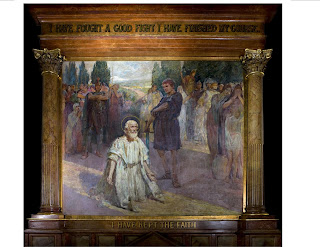Some 30 years ago, a majority of American men had a half-dozen or so close friends. Today, half as many do, and many say they have no close friends at all. That’s a problem if, as is widely believed, having friends enriches one’s life and is probably good for one’s health. Aristotle famously said that no one would choose to live without friends, even if he had all sorts of life’s other goods.
One cannot read the opening words of Paul’s 2nd letter to Timothy without appreciating the intense bond of friendship between the two. I am grateful to God, Paul writes, as I remember you constantly in my prayers, night and day. I yearn to see you again, recalling your tears, so that I may be filled with joy.
As friends, Paul and Timothy shared a common mission – the mission which Paul had received directly from the Risen Lord and which Timothy had received from Paul, the gift of God that you have through the imposition of my hands.
Jesus, as we just heard in the Gospel, famously sent his disciples out on mission in pairs, not just because a group effort would be more efficient but because of the greater witness value of non-competitive, collaborative life and work in partnership. In the Middle Ages, Saint Dominic, one of the patrons of the Paulist Fathers, whom we will commemorate later this week, discerned the special witness value of such an apostolic manner of life for his time and place. And, in the 20th century, the Second Vatican Council likewise highlighted how such an evangelical life witnesses to God’s kingdom at work in the world through the Church.
In today’s climate of predatory individualism, a dead-end into which our consumerist culture seems increasingly capable of absorbing even religion itself as well as so much of the Church’s life, the renewed witness of shared life and mission cannot be underestimated.
Homily for the Feast of Saints Timothy and Titus, Disciples and Companions of Saint Paul, Church of Saint Paul the Apostle, New York, January 26, 2023.




